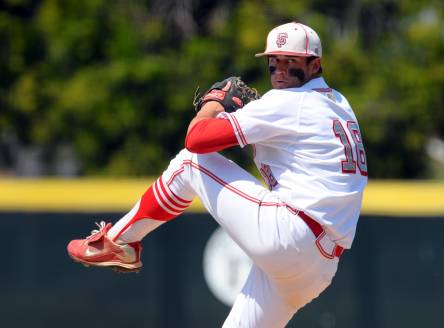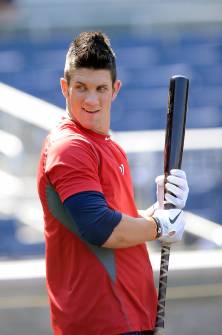
Brady Corless has decided to graduate from high school a year early and play at a local junior college, similar to what MLB star Bryce Harper did. While more attention is being paid to players leaving early, it's likely to stay a rare occurrence.
Photo by David Hood
Giving up a year or two of high school eligibility to speed up a possible professional baseball career worked for a superstar like Bryce Harper, but how many players are talented enough to start in the Major Leagues at age 19?
And how much damage does it do to a high school program that has worked with a youngster for several years, then loses him when he was ready for his peak production?

Bryce Harper was a star prospect froman early age, as he graced the coverof Sports Illustrated as a 16-year-old.
Getty Image
It's fairly easy for a good student to get his GED and head for a junior college. Or, some even graduate a year early because they already have enough credits.
But will those types of students do so just to get to the pros quicker, adding clout to a national trend? Many coaches are doubtful.
Sam Thomas, who coached Harper for two years at
Las Vegas, told MaxPreps, "To me, there are two sides to that. I can see some parents holding their kids in the same regard (as a Bryce Harper). College coaches out there are smart enough (as wise advisers) that I don't think it's going to be a trend."
D.G. Nelson, head coach at Salt Lake Community College in Utah, has seen both sides of the coin this year.
Nelson recently received a pledge from
Brady Corless, who was expected to be the ace next spring at
Spanish Fork (Utah). The 6-foot-1, 195-pound right-handed pitcher posted a 7-2 record as a junior with 96 strikeouts and a 1.97 ERA. This summer his fastball has reached 93 mph and he just was named to a prestigious All-American game in San Diego.
Nelson noted, "I think when kids have the ability, they're going to be looked at and have a chance (to turn professional more quickly). I really encourage kids to do everything they can to be a Major Leaguer, but don't get too hyped up in being drafted, what round and the money."
On the flip side, Nelson revealed, "It's a crazy thing. This year I've had to talk two or three kids out of it (skipping a year of high school to join his program)."
Corless missed passing his GED during the first seven-hour test by 10 points, but he is a good student and he expects to make it on the next try.

Brady Corless finished with a 1.97 ERAlast season at Spanish Fork.
Photo by David Argyle
He related, "My mom, dad and I talked to D.G. and he thought it would work for me. He's really good with mechanics and just the training, as well. Being around that elite group of players is going to push me. I'll love being around those players. I'm not going to try to be Bryce Harper, but I just want to progress and get better."
Some of those being left behind are not too happy, according to a story in the Salt Lake Tribune.
Spanish Fork coach Jim Nelson (no relation to D.G.) said, "I disagree with it, and a lot of the baseball people I've talked to have disagreed with it. But kids make these decisions and you can't really do much about it. I just hope he's the one making the decision and no one is making it for him."
Asked if he had received much flack, Corless replied, "Nothing that was said to my face. I've heard some stuff (was said). It was a tough decision. They have a great program at Spanish Fork."
Salt Lake Community College plays in the tough Scenic West Athletic Conference - which includes schools from Utah, Nevada, Idaho and Colorado - and often produces teams ranked among the nation's top 10 junior colleges.
D.G. Nelson can speak about what one year of junior college did for Harper because his team faced College of Southern Nevada three times.
He admitted, "It surprised me that a kid could do what he did, because it's a pitching-dominant league. The first time we were able to get him out. The second time you could see him getting better. In the semifinals (of the playoffs) he went 5-for-5 on all different pitches and all five different parts of the zone."
Tim Chambers coached Harper in junior college before taking over as head coach at UNLV. He listed several very good reasons for Harper skipping his last two years of high school.
"They weren't pitching to him," he noted. "He was unchallenged at that level. And he was going to hurt somebody. At age 15 his bat speed was faster than Mark McGwire in his prime."
At 6-3 and 225 pounds, Harper was especially lethal with an aluminum bat. Even so, he belted 31 home runs with a wood bat at Southern Nevada. The previous record - using aluminum at the time - was only 12. His bat speed was clocked at an amazing 118 mph.
Even though Chambers saw a player benefit from leaving high school two years early, he's not convinced that it's the best path for most teens to take. Leaving one year early would make more sense.
"I think you'll see some (skip their senior year), but I certainly don't believe any other kids after their sophomore year will do that. I don't think it's a wise decision. Hopefully, coaches will be honest and say, 'You're not ready.'"
Thomas had a great attitude even though he lost a superstar for two years. After all, Harper batted a lofty .569 as a sophomore and hammered a spectacular 502-foot home run during a showcase at Tropicana Field in Tampa, Fla.

Part of the reason why Harper jumpedto junior college was that opposingteams were walking him too often.
Getty Image
He pointed out, "I never saw anybody work as hard as this kid. A lot of our practices went three or four hours. He would leave practice, jump in the truck with his dad and hit for another one and one-half hours. I never saw a kid with the work ethic that Bryce had. It was frustrating to me what was being done to him. He was not getting anything to hit. He was getting intentionally walked, so we put him in the leadoff spot."
Thomas took the loss philosophically.
"Every coach puts in the time," he said. "But our ultimate goal is to try to make kids better and your job is to prepare kids to get to the next level. We all want to win. I didn't look at it like a slap in the face. I wasn't going to have him forever. If he was ready after two years for the next level, you've done your job. I won't see another kid like him the rest of my career.
"It could be a trend and a lot of parents want it to be a trend, but a lot of college coaches are smart enough that I don't think it will be a trend."
